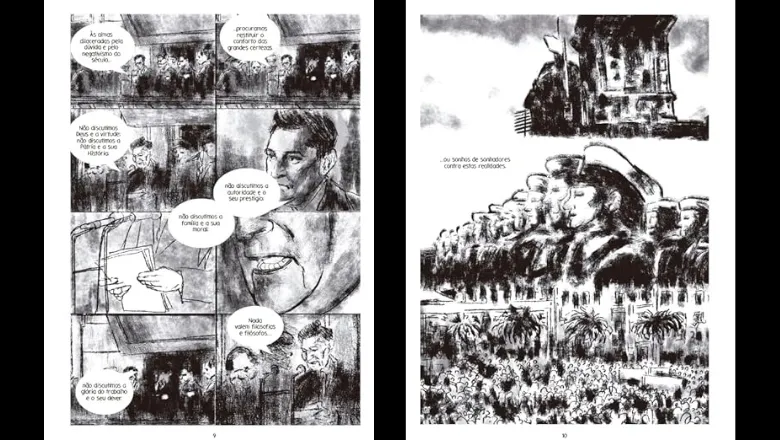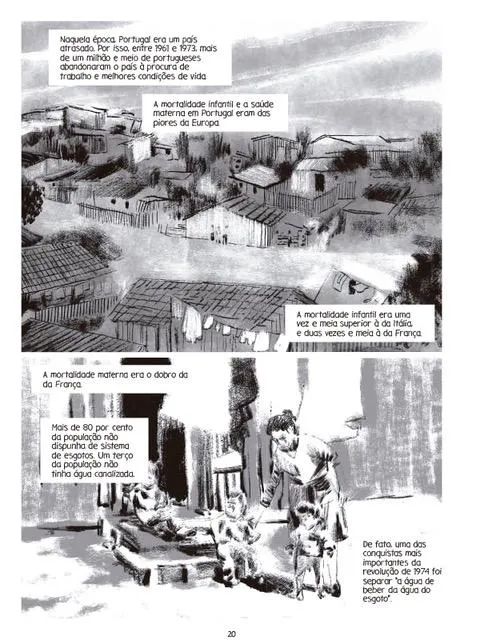This paper highlights the evolving relationship between Portugal and its revolutionary past, demonstrating how the April 25th Revolution continues to resonate in Portuguese cultural memory. Through the lens of comics, it reveals a society that grapples with both the celebration and critique of its historical milestones. By intertwining art and historiography, these narratives offer valuable insights into the complexities of identity, memory, and the enduring impact of the Estado Novo regime.
Alexandra Lourenço Dias, Camões Lecturer in Lusophone Studies in the Department of Languages, Literatures and Cultures
27 January 2025
Academic explores role of comics in charting political upheaval
Portuguese comics function as historical and artistic records of political upheaval, says Alexandra Lourenço Dias, Camões Lecturer in Lusophone Studies in the Department of Languages, Literatures and Cultures, in a new paper.

Through analysis of works depicting the April 25th Revolution in 1974, which prompted the end of the Estado Novo dictatorship, Dias interrogates the role of the comic in memorialising events for future generations.
Portugal has a long history of employing visual culture as a vehicle for social and political commentary. Dias’ paper, ‘Illustrating History: April 25th in Portuguese Comics’, published in International Public History, positions comics as important artistic and historiographical tools.
Comics from this period of Portugal’s history are often grouped as ‘BD de April’ (‘April Comics’), with themes including the military uprising and the wider context before and after the Revolution. ‘BD de April’ refers not just to the individual date, but also to the circumstances that led to the political awakening in Portugal that sparked the revolution.
The initials ‘BD’ stand for ‘banda desenhada’, a Francophone term used to describe Franco-Belgian graphic narratives. Use of this term signals a shift in perceptions towards comics in Portugal, as they became recognised as a respected art form.

In the article, Dias looks at works from the pre-revolution period through to post-revolution society and subsequent anniversaries of April 25th, when comics from the time were revisited and celebrated.
When Portugal became a democratic state after the revolution, comics changed significantly. Artists gained more political freedom to express their ideas, which led to a rise in creativity, innovation and openness of ideas.
‘BD de April’ graphics offer opportunities for individuals to share firsthand experiences of the Estado Novo, revolution and its aftermath. Portuguese artists focus heavily on accurately portraying historical realities as a means of ensuring reliable and authentic narratives, which is vital for recording events and their impact.
As Portuguese society becomes more open to discussion and reflection on the past, there is a growing interest in narratives that observe the impact of trauma, contributing to the recognition of trauma as a crucial step in the healing and reconciliation with the past.
Alexandra Lourenço Dias, from the article ‘Illustrating History: April 25th in Portuguese comics’ in International Public History
Despite its historical significance, there are few examples of work narrating the military events leading up to the coup. Utopia (2024) by Raquel Varela and Robson Vilalba is one such example, which charts a character’s experience of the Estado Novo’s last years and illuminates the broader impact of the revolution.
Dias’ analysis of Utopia highlights how the artistic style, grid spacing and vivid portrayals of activity offer a subjective view of history, as both a documented reality and something shaped by memory, perception and creative expression.

